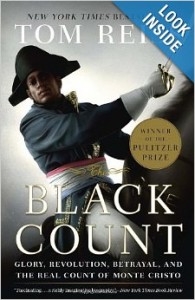The Black Count, by Tom Reiss
Review by Bruce Roberts
As a kid, I devoured the novels of Alexander Dumas. I agonized at the misery of The Count of Monte Cristo and The Man in the Iron Mask, and thrilled at the masterful sword battles against corruption of Athos, Porthos, Aramis–The Three Musketeers, plus one: D’Artagnan. “All for one and one for all” became a neighborhood rallying cry. Little did I know that the suffering and adventures of Dumas’ characters were often modeled on a real life character—his father.
The Black Count, by Tom Reiss, is a wonderful book in so many ways. Winner of the Pulitzer Prize for Biography in 2013, Reiss traces the life of Alex Dumas Sr. from a poor half-French, half black slave child in the French Caribbean, to General Alex Dumas, a hero in charge of thousands of troops in the French army under Napoleon during the French Revolution, to a real life Monte Cristo trapped in an Italian prison.
The Black Count, however, besides developing Alex, the general much loved by Alexander, the famous author, is rife with historical insight. For example, the history of the French sugar plantations in the Caribbean is explored, from the first sugar cane brought by Columbus, to France’s takeover from Spain and Portugal. By France’s rule, African slavery was in full swing, and from it came Alex Dumas, son of a French nobleman and a slave woman.
Alex Dumas was fortunate. Had his father left him in the Caribbean, none of this miraculous life would have occurred. But brought to France, Alex received a fine education, one that included swordsmanship from the finest teachers. This was possible because his education coincided with the stirrings of the French Revolution, and despite the insanity rampant at that time, part of the Revolution’s philosophy treated everyone as equal. This meant abolishing slavery in the sugar colonies and treating black citizens as equals in every way.
Thus, after joining the French army, Alex rose through the ranks as one of France’s most heroic and successful generals. He commanded thousands of men, and was quite often the actual hero, once holding a bridge in Austria by himself before help came along. His strength and sword skill made him much more than a sideline strategist like Napoleon.
Unfortunately, returning from a campaign in Egypt, Dumas was captured by Italians hostile to the revolution. He spent years as a captive, ala The Count of Monte Cristo. Finally released, he made it home to his family in poor health, and by the time he recuperated, Napoleon had realized that abolition of slavery had hurt France’s sugar income. Slavery was reinstituted, and acceptance for blacks cooled considerably. His father died poor and out of the limelight, and despite his popular novels, Alexander Jr. faced discrimination throughout his life.
The Black Count is a well-told story of history, character, and adventure. And for fans of Dumas Jr.’s swashbuckling novels, to think that his popular heroes are fictional representations of the father he idolized, makes them all the more appealing to read.

